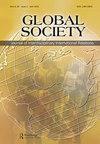创新算法战:超越法律边界的信息机动实验
IF 2.3
Q2 INTERNATIONAL RELATIONS
引用次数: 0
摘要
本文分析了当代战争中的算法创新如何通过民事和军事行为体之间的新联盟和争论展开,面对围绕领导“信息操纵”需求的总体修辞。利用集合思维并将其应用于土地信息机动中心(LIMC)的案例,作者确定了将该中心整合在一起并帮助抵御批评的三种逻辑:创业精神、非正式性和实验。LIMC是荷兰军队建立的数据中心,在COVID-19大流行期间非法跟踪和算法预测其公民的情绪和行为。这些逻辑与其他地方的创新实践相结合,在荷兰案例之外产生了重要的政治影响,推动了军事监视、模式发现和目标定位的扩大,同时破坏了算法战中的法治和民主问责制。本文章由计算机程序翻译,如有差异,请以英文原文为准。
Innovating Algorithmic Warfare: Experimentation with Information Manoeuvre beyond the Boundaries of the Law
This article analyses how algorithmic innovation in contemporary warfare unfolds through new alliances and contestations among civil and military actors in the face of an overarching rhetoric around the need to lead in “information manoeuvre”. Drawing on assemblage thinking and applying it to the case of the Land Information Manoeuvre Centre (LIMC)—a data centre founded by the Dutch Army that unlawfully tracked and algorithmically predicted its citizen’s sentiment and behaviour during the COVID-19 pandemic—the authors identify three logics that held this centre together and helped ward off critique: entrepreneurialism, informality, and experimentation. Emulating innovation practices elsewhere, together, these logics have important political repercussions beyond the Dutch case, pushing the expansion of military surveillance, pattern-finding and targeting, while undermining the rule of law and democratic accountability within algorithmic warfare.
求助全文
通过发布文献求助,成功后即可免费获取论文全文。
去求助
来源期刊

Global Society
INTERNATIONAL RELATIONS-
CiteScore
3.10
自引率
6.20%
发文量
32
期刊介绍:
Global Society covers the new agenda in global and international relations and encourages innovative approaches to the study of global and international issues from a range of disciplines. It promotes the analysis of transactions at multiple levels, and in particular, the way in which these transactions blur the distinction between the sub-national, national, transnational, international and global levels. An ever integrating global society raises a number of issues for global and international relations which do not fit comfortably within established "Paradigms" Among these are the international and global consequences of nationalism and struggles for identity, migration, racism, religious fundamentalism, terrorism and criminal activities.
 求助内容:
求助内容: 应助结果提醒方式:
应助结果提醒方式:


